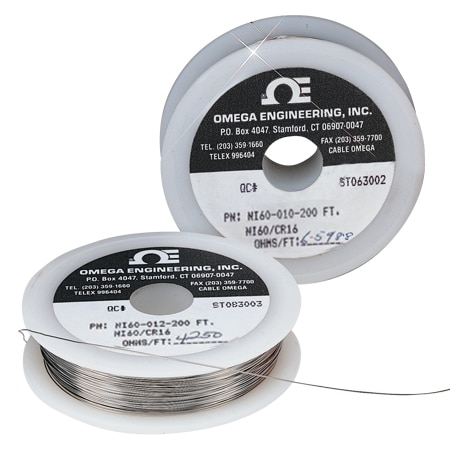Welcome to our new website, found an issue or bug? Please report it here

NI60
1850 °F Max 60 Nickel 16 Chromium Resistance Heating Wire
Models In Stock
- Used to Make Straight or Helical Coil Resistance Heaters
- Quick Heating, Long Life
- High Temperature, 1000°C (1850°F)
- Corrosion Resistant
NI60
From
C$
24.50
Models In Stock
Product Overview
- Heater Wire Material 60% Nickel, 16% Chromium
- Melting Temperature 1350 °C
- Operating Temperature, Max 1000 °C
- Specific Gravity 8.25
- Specific Resistance Note 675 Ω per circular mil-foot at 20°C (68°F). See table below for multiplication factors to obtain resistance at other temperatures
- Thermal Expansion Coefficient 1.7E-5
- Thermal Expansion Coefficient Note 0.000017 (20 to 1000°C)
Nickel-Chrome 60 is the world’s standard of comparison in the electrical trade for metallic resistance wire. It is an alloy of 60% nickel and 16% chromium, and is the accepted material for heating devices operating up to 1000°C (1850°F). This encompasses most pluggable power cord domestic heating appliances and those heating units of medium temperatures which do not require the unsurpassed quality of NI/CR-80/20, the 80-20 alloy.
In addition to being commonly used in electrical heating, Nickel-Chrome 60 is used extensively in industrial applications for rheostats and resistance units. It makes for compact units capable of withstanding severe overloads and short circuits without damage or circuit impairment.
The excellent corrosion resistance of Nickel-Chrome 60 makes it very useful for purposes other than electrical heating. Acid dipping baskets, cyanide hardening and pickling containers, filter cloth, wire mesh, bolts and nuts are a few representative uses.
Examples of pricing for popular models is referenced in the "To Order" box. Use the "Part Number Builder" below to get pricing for all available models.
For complete product specifications see the Related Links section at the bottom of this page.
In addition to being commonly used in electrical heating, Nickel-Chrome 60 is used extensively in industrial applications for rheostats and resistance units. It makes for compact units capable of withstanding severe overloads and short circuits without damage or circuit impairment.
The excellent corrosion resistance of Nickel-Chrome 60 makes it very useful for purposes other than electrical heating. Acid dipping baskets, cyanide hardening and pickling containers, filter cloth, wire mesh, bolts and nuts are a few representative uses.
Examples of pricing for popular models is referenced in the "To Order" box. Use the "Part Number Builder" below to get pricing for all available models.
For complete product specifications see the Related Links section at the bottom of this page.
Show Ratings & Reviews
Rated 5 out of
5
by
Ramya from
Very good product!!!
Yes its good product to buy . Great!!!!! Can recommend this product
Date published: 2018-12-04
Rated 4 out of
5
by
Andrew99 from
Good wire, delay in shipping
Reliable quality NiCr wire. Just wish the shipping wasn't so slow, but that is UPS' fault.
Date published: 2021-04-09
Would this heat wire work right out of the box without any added insulation or would you need to avoid contact with other metals to avoid a short. I would like to distribute heat across a metal surface and I am wondering if I would need insulating resin.
Thank you for connecting with Omega. Our Nickel-Chromium heating wire is not insulated.
The wire would need to be isolated from any electrically conductive surface.
Date published: 2020-06-16
What gauge is this wire?
Thank you for contacting Omega Engineering.
Wire gage is determined by end user under 'dimension' field. Check below for nominal size vs AWG
18 AWG = 1.0 mm (0.040")
20 AWG = 0.81 mm (0.032")
22 AWG = 0.64 mm (0.0253")
24 AWG = 0.51 mm (0.0201")
26 AWG = 0.40 mm (0.0159")
28 AWG = 0.32 mm (0.0126")
30 AWG = 0.25 mm (0.010")
Date published: 2021-12-10